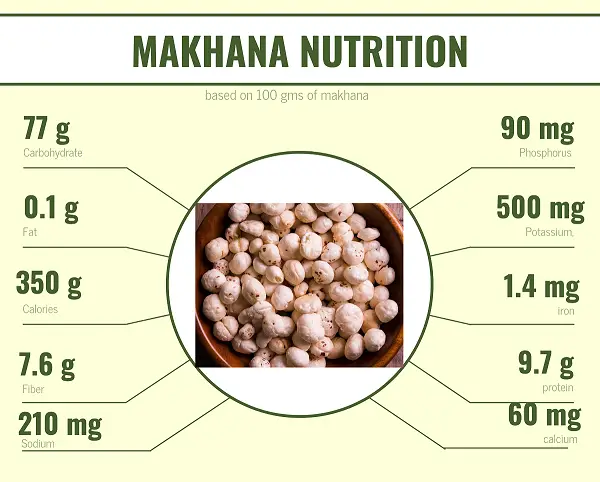(Fox Nuts) Proven Makhana Benefits, Nutritional Value and More
Makhana, the mystical snack of India, holds within its delicate appearance a world of nutrition and tradition. Harvested from the pristine waters where lotus flowers bloom, these puffed seeds have been cherished for centuries. Often referred to as “fox nuts,” they possess a light, airy crunch that dances on the palate. Also known as lotus seeds; it is rich in nutrients, has high antioxidants (protects the cell from damages), helps in stabilizing blood sugar levels, is considered to be very healthy, and is good for people with high blood pressure. Makhana or Phool Makhana are calcium-rich which makes them great for teeth and bones. It is well known for reducing kidney problems since it has got astringent properties i.e. it helps in cleansing. Makhana is known by various names; Euryale faro, Paniyphalam, makhatrah, kantpadma, mellunipadamamu, jeweir, sivsat, gargon fruits, prickly water lily, etc. Let us discuss in detail, the magical benefits of including Phool makhana in your diet. As you savor the subtle, nutty flavor of makhana, you’re not just indulging in a snack; you’re embarking on a journey through time, a taste of nature’s wisdom, and a delightful secret to both health and culture.
Table of contents
- 1. Makhana Benefits: Nutrient Rich
- 2. Benefits of Makhana: Abundant level of Antioxidants
- 3. Makhana Benefits: Weight loss
- 4. Makhana Benefits: Stronger bones
- 5. Makhana Benefits: Better digestion
- 6. Makhana Benefits: Stronger heart
- 7. Makhana Benefits: Anti-ageing
- 8. Makhana Benefits: Helps in improving cognitive functions
- Makhana/Phool Makhana Nutrition
- Makhana Nutrition al Value
- How much makhana can I eat in a day?
- Which time is best for eating makhana?
- Is makhana good for bones?
- Can I eat Makhana daily?
- Can we eat Makhana at night?
- Is Makhana expensive?
- Is roasted Makhana good for health?
- Can makhana cause allergy?
- Is it ok for diabetic patients to consume makhana?
- What are the ways to consume makhana?
- Can makhana be used in case of male infertility?
- Can makhana cause gas?

Makhana/ Phool Makhana (fox nuts) is incredibly a health booster, even though it is associated with fasting in India, it has a copious amount of benefits. Chinese use it as medicine due to its huge medicinal benefits. Earlier western countries were not aware of makhana, but today the demand for makhana has increased substantially. Makhana/Phool makhana/foxnuts are recommended by dieticians to those who are following diets to lose weight. Makhana is known to reduce hypertension, and insomnia, and even increase fertility rates in men and women. In Ayurveda makhana has a significant place due to its medicinal purposes. Makhana can be consumed by adding spices since it has a bland taste or can even be roasted a little bit to get rid of the raw taste. Let us see the nutritional Phool Makhana benefits in general as well as the benefits of eating Makhana.
In case you are looking for balanced and quick way without adverse effects to loose weight faster. Check this article out How to lose weight fast? – Expert’s Guide
1. Makhana Benefits: Nutrient Rich

Makhana or Fox nut is a brilliant source of various significant nutrients. It contains a decent amount of carbs, rich in protein, potassium, magnesium, iron, and other micronutrients. Our body needs nutrient-rich food for it to function well and the studies say there are mainly six essential nutrients that one needs to consume which are carbohydrates (CHO), lipids(fats), proteins, vitamins, minerals, and water(H2O). Magnesium helps in muscle and nerve function for the support of the body, provides a healthy immune system and a steady heartbeat. The presence of Iron helps in the growth and development of our body, being the source of the production of haemoglobin, which is essential for providing oxygen to muscles. Our body requires proteins as it helps in carrying oxygen throughout the body and are hence essential to be included in the diet.
Before going forward just wanted to ask this question to you, are you also living in an area with high pollution levels? Well if you are one of us, you need to add Antioxidants in your diet to reduce the effects of pollution my friend. Add These Foods to Build Resistance Against Effects of Air Pollution
2. Benefits of Makhana: Abundant level of Antioxidants

Makhana(Fox nut ) is said to be a detox agent that removes toxins from the body. It particularly consists of Gallic acid, chlorogenic acid, and epicatechin. Researchers say that makhana helps in curing chronic diseases including kidney issues, chronic diarrhea, excessive leucorrhoea (flow of whitish/yellowish discharge from the vagina due to infection), and hypofunction of the spleen by eliminating all the spleen from the body keeping it clean. Antioxidants are manmade substances that prevent damage to cells, it scavenges free radicals from the body which are responsible for cell damage. Antioxidants help in reducing inflammation such as rheumatoid arthritis, gout, psoriasis, and inflammatory bowel. We can avoid these types of diseases as the benefits of eating makhana.
3. Makhana Benefits: Weight loss
Being rich in protein, Phool Makhana’s consumption helps one stay full for a longer period after eating it, reducing the appetite which helps in the prevention of overeating. It has a lower amount of calories making it a classic weight-loss snack. It has a modicum of saturated sugar which makes it even healthier. Makhana/Phool Makhana, for weight loss, can be consumed by soaking it in water overnight which can be added to salads, curries, or even soups. It is also used in rice pudding, but try to consume it without frying it; instead, cook it according to your taste. To make the most of makhana for weight loss, it’s important to consume them in moderation as part of a balanced diet that includes a variety of foods. Avoid adding excessive amounts of oil or unhealthy seasonings when preparing them, as this can negate their weight loss benefits. Pair makhana with other healthy snacks and meals to support your weight loss goals, and consider consulting with a registered dietitian for personalized guidance on incorporating makhana into your diet.
Skipping is also a very good exercise that can help you lose weight quickly. Here’s everything you need to know about Skipping for weight loss with Benefits, Effectiveness, Tips for Skipping rope & More: Skipping for weight loss
4. Makhana Benefits: Stronger bones

Due to the high amount of calcium contained in Makhana, it helps to maintain one’s bone health and it improves the strength of the bone with regular consumption. It helps in improving bone and teeth. It helps people with bone-related diseases such as osteoporosis and doctors instruct you to include Makhana/Phool Makhana in your diet rather than consuming salutary medicines. Magnesium, present in makhana, is involved in bone metabolism. It aids in the absorption and utilization of calcium and helps convert vitamin D into its active form, which is essential for calcium absorption. Makhana contains calcium, which is a fundamental mineral for bone health. Calcium is a primary component of bone tissue, and a diet rich in calcium helps maintain bone density and strength. If you are having osteoarthritis, you can shallow fry makhana in ghee and have it with milk which increases the consumption of calcium.
5. Makhana Benefits: Better digestion

Since makhana is rich in fiber they sort out the digestive processes, which helps in preventing constipation. Digestion is an important function of the body that needs to be looked into very seriously and measures should be taken to ensure proper digestion as the essential substances for the body enter through our diet. Consumption of makhana can help improve bowel movement, the fiber content in makhana helps in bulking up stools and retaining water; fiber cleanses your colon helping to clean out the bacteria present in your intestine. Daily consumption helps in proper digestion. Some studies suggest that lotus seeds, the source of makhana, may possess anti-inflammatory properties. Reducing inflammation in the digestive tract can contribute to improved digestive comfort. Makhana is naturally gluten-free, making it a suitable snack for individuals with gluten sensitivities or celiac disease, which can cause digestive discomfort.
If you are having diarrhea you can take a handful of makhana, shallow fry it in ½ to 1 teaspoon of ghee, and consume it with any light food.
6. Makhana Benefits: Stronger heart

Makhana contains low cholesterol and a higher quantity of potassium that helps to decrease blood pressure in patients with hypertension. The low amount of sodium helps maintain blood pressure whereas magnesium improves the quality of the blood and maintains the oxygen level. Makhana is known for curing cardiovascular diseases; cardiovascular diseases which include blocked blood vessels which if left unattended can lead to heart attacks, strokes, etc. heart diseases can also be caused due to high cholesterol, intake of saturated sugars, and obesity. Daily a handful of makhana to the diet would help reduce the risk of cardiovascular diseases as well as keep the heart healthy.
7. Makhana Benefits: Anti-ageing
Ageing is a common concern that is found among people lately, i.e. your skin shows wrinkles, lose elasticity, laxity, and would have a rough texture to it. People are using several skin products that include chemicals and that would only result in more damage to the skin and even stop showing results when you stop using it. Makhana constitutes of ample amount of antioxidants and amino acids, which help in anti-ageing. Daily consumption helps to make your skin glow. Makhana/ Phool Makhana is said to be containing the anti-ageing enzyme kaempferol. It prevents acne, inflammation, and repairs damaged proteins arresting ageing, tightens the skin and reduces wrinkles, and helps to control early ageing. Exposure of skin to air solar radiation etc. can cause damage to the skin and this generates free radicals; these would attract free atoms from the atmosphere to stabilize the skin thus, causing oxidative stress and leading to DNA damage, the detox contents that is present in makhana helps in the elimination of these free radicals and helps keep it clean. It also helps to protect from skin cancer, maintain skin moisture too.
8. Makhana Benefits: Helps in improving cognitive functions
Cognitive function is the multiple mental abilities that include learning to remember, thinking, reasoning, problem-solving, decision-making, and other abilities. Thiamine is the essential cofactor of several enzymes which are involved in brain cell metabolism required for the production of the generation of ATP and other several components. Consumption of thiamine helps sustain the cognitive function of nerves, consumption of makhana also generates acetylcholine that helps in the process of neurotransmission. The better cognitive ability helps to learn, think and remember things, even controlling the movement of the body keeping a balance in a better way. Deficiency in thymine can cause beriberi, memory loss, and confusion.
Makhana Nutrition or Foxnut Nutrition should be mandatorily discussed since you should be aware of the makhana nutrition to start including it in your diet and adjust your diet according to it, so now let’s move on to the Phool Makhana nutrition or the Fox Nut nutrition.
Article Recommendation: While we don’t recommend or bug you with lots of self-promotional text in our articles, this has to be an article you should definitely checkout If you wish to stay fit in life. Best Types of Cardio Workouts for Weight Loss with tutorials & Benefits
Makhana/Phool Makhana Nutrition

Maintaining a proper diet helps and supports normal growth, development, and ageing and reduces the risk of diseases. One should look into the nutritional value before consuming a certain food is because it has an impact on health. So, you should be very keen while consuming food. Makhana (Fox nuts )nutrition or the Fox nut nutrition is very well known among the people who are diet routinists. Let us look into the nutritional value of makhana.
Foxnuts aka Makhana’s nutritional value points out at its high fibre, low glycemic index, and low calories, it contains a very negligible amount of fat making it the best choice for people going on diet for weight loss. Hence makhana nutrition is mostly recommended by dieticians.
Makhana Nutritional Value
| Nutrients | Value per 100g |
| Makhana calories | 350 |
| Makhana Carbohydrates | 308 |
| Makhana Poteins | 39 |
| Makhana Fat | 1 |
| Makhana Saturated fat | 0 |
| Makhana Trans fat | 0 |
Macronutrients
| Total carbohydrates | 77g |
| Total lipids(fat) | 0.1g |
| Total protein | 9.7g |
| Total dietary fibre | 7.6g |
Minerals
| Calcium | 60 mg |
| Iron | 1.4 mg |
| Magnesium | – |
| Phosphorous | – |
| Potassium | 500 mg |
| Sodium | – |
Makhana is very rich in calories which is about 350/ 100g and in contrast, the amount of lipids is only 0.1g, which is why these are recommended by dieticians for weight loss. It is rich in proteins and fibre which are the most necessary substances that must be included in a diet for a healthy body.
Some frequently asked Questions:
One needs to consult a dietician while taking over a diet and also to enquire about the doubts. Given below are a few repeatedly asked questions in a general way.
How much makhana can I eat in a day?
A. A handful of makhana would be enough for a day to have a better health result. Consume Phool Makhana as a part of diet by making it a dish or as a snack, but remember not to consume it fried as the benefits could get lower. It can make you feel fuller for a longer period due to the number of proteins present in it. Also keep in mind too much of anything can harm you, so see to it that you are limiting the amount of Makhana you are consuming to a minimum and wait for the makhana befits to show within you.
Which time is best for eating makhana?
A. You can consume at any time of the day, you can have makhana with green tea and the best way to consume makhana would be as a snack made along with vegetables. Try including a portion of the Phool Makhana into every meal that you consume in a small quantity. Use it in a different way while including it in your diet so that you won’t get tired of eating it as makhanas are too bland for people who love spicy food.
Is makhana good for bones?
A. Yes, Makhana is good for bones due to its richness in calcium content. It helps to maintain stronger bones and teeth and it helps patients with bone diseases too. As described in the Makhana nutrition chart, you consume 60g of calcium when you consume 100g of Makhana which is a very huge amount when compared to other diets. So, for people who are struggling with bone diseases, osteoporosis (bone deterioration), women who have white discharge can have Phool makhana for avoiding such things.
Can I eat Makhana daily?
A. Yes, you can take makhana daily, a handful of consumption of makhana daily would enhance your skin to make it look younger and also to maintain good health, a better digestive system, and heart rate. You can include a decent amount of makhana not too much nor too little in your daily diet to get better results and remember not to overdo it because overdoing would only result in health issues. So try including a little portion of Phool makhana /Fox nut in your daily diet. Let it be a little part but make sure to include it in your diet.
Can we eat Makhana at night?
A. Yes, Phool Makhana can be eaten any time of the day and it has got no restriction. It is a good midnight snack. It would be better to consume such snacks at midnight rather than junk food. Make sure for people who are having digestion problems are not consuming it too much during the night time because it can cause indigestion for them resulting in stomach ache and nausea or even bloated stomach.
Is Makhana expensive?
A. Good dietary food is always expensive when compared to those with less nutritional value but Makhana is not very expensive and it is also not too cheap, we can say it is affordable that is approximately 600-700 INR which is about the same as almonds and cashew nuts costs per kilogram in the market.
Is roasted Makhana good for health?
A. Roasted makhana is not considered healthy, but for extracting the maximum benefits, it is good to be consumed without frying or roasting it. Makhana benefits can be extracted by consuming it in the purest way since everything that is savoury has got its own risks to health. It is always good to consume nutritious food the natural way to get the maximum result so try consuming makhana in its natural form and not by roasting it.
Can makhana cause allergy?
A. It depends on the person’s physical health also it should be consumed by pairing it up with the other diet and one thing to keep in mind is that excessive consumption can cause gastrointestinal issues, bloating, and other issues. If you are noticing any issues while consuming makhana in your diet try consulting a doctor. Before including Phool Makhana in your diet, make sure to look into the Makhana Nutrition so that you can see to it if anything that causes allergy is present in the Makhana Nutrition chart.
Is it ok for diabetic patients to consume makhana?
A. Yes, it is completely ok for diabetic patients to eat makhana as it is a low glycaemic food and it helps to manage the blood sugar level. The sugar level in makhana is completely safe for diabetic patients and also their low sodium and high magnesium level is of good benefit for people having diabetes. As per the Makhana Nutrition chart, it consists of carbs less than 100g which is considered to be low carb which is safe for people suffering from type 2 diabetes.
What are the ways to consume makhana?
- Normal consumption –Take a handful and add it to your salad or curry.
- Roasted makhana
- Heat oil in a pan, once the oil is hot add the makhana to it turn the flame to simmer, and wait for it to get crunchy.
- Season the makhana with salt, pepper, and chaat masala which is optional.
- Powdered makhana
- Take 2-3 cups of makhana and grind it to a fine powder.
- Take half a cup of the powder in a bowl add hot water and whisk it with a spoon to dilute the lumps then add ghee and mix it well, you can add honey before you drink it to add a little bit of sweetness.
- This is a good baby food with high nutritional value.
- Makhana Kheer – Take full-fat milk in a pan and then add sugar and reduce it just the way you make kheer, add makhana instead of rice. Add dry fruits, and cardamom and enjoy.
Can makhana be used in case of male infertility?
A. Yes, makhana can be used in the case of male infertility. It improves semen quality and prevents early discharge. However, it’s important to note that makhana alone is not a direct treatment for male infertility. It can contribute to overall nutrition and well-being but should be combined with a broader approach to address the underlying causes of infertility, as recommended by a healthcare professional.
Can makhana cause gas?
A. Yes, excessive consumption of makhana can cause gas and make you feel bloated. Makhana, or fox nuts, are generally considered to be a low-risk food when it comes to causing gas or digestive discomfort. They are a light and easily digestible snack. However, individual reactions to foods can vary, and some people may experience gas or digestive issues after consuming makhana, especially if they are sensitive to certain ingredients or have underlying digestive conditions. If you find that makhana or any other food causes gas or discomfort for you personally, it’s advisable to consume them in moderation or consider any potential food sensitivities.




